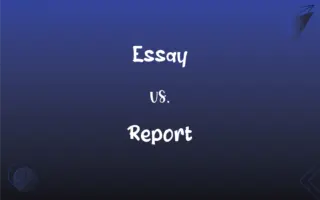Language vs. Literature: What's the Difference?
Edited by Aimie Carlson || By Harlon Moss || Updated on October 23, 2023
Language is a system of communication, while literature is the art of written works using language.

Key Differences
Language is the structured system through which humans convey thoughts, emotions, and information. Literature, on the other hand, employs language artistically to craft narratives, poetry, and other written forms.
Language serves as the foundational building block for any culture, fostering understanding among its members. In contrast, literature is the manifestation of a culture's imagination, history, and values through the written word.
While language has grammatical rules, phonetics, and syntax governing its use, literature explores the limitless possibilities, styles, and genres language can offer.
Moreover, language evolves over time, adapting to societal changes and technological advancements; literature captures these evolutions, preserving moments, ideologies, and epochs in tangible forms.
Comparison Chart
Definition
System of communication.
Art of written works.
ADVERTISEMENT
Grammatical Usage
Typically a singular or plural noun.
Typically a singular or plural noun.
Function
Convey thoughts, emotions, information.
Craft narratives, poetry, drama.
Components
Phonetics, syntax, grammar.
Plot, characters, theme, style.
Dependency
Can exist without literature.
Depends on language for expression.
Language and Literature Definitions
Language
Language can be spoken, written, or signed.
Sign language provides inclusivity for the deaf community.
ADVERTISEMENT
Literature
Literature encompasses various genres and styles.
Gothic literature has always intrigued her.
Language
Language consists of phonetics, syntax, and grammar.
She excelled in understanding the nuances of language.
Literature
Literature is a form of art using words.
The literature of the Renaissance was rich in allegory.
Language
Language represents cultural identity.
Each region in the country had its own distinct language.
Literature
Literature is a body of written works.
The library houses centuries of literature.
Language
Language evolves over time.
Old English is vastly different from the language we use today.
Literature
Literature reflects societal values and beliefs.
Dystopian literature offers insights into societal fears.
Language
Language is a tool for communication.
The language barrier made it hard to converse.
Literature
Literature can be factual or fictional.
Biographical literature narrates the lives of real individuals.
Language
Communication of thoughts and feelings through a system of arbitrary signals, such as voice sounds, gestures, or written symbols.
Literature
The body of written works of a language, period, or culture.
FAQs
How is literature different from other writings?
Literature is characterized by its artistic merit, often reflecting cultural, social, or personal values.
How does language influence thought?
Language shapes how we perceive, categorize, and relate to the world around us.
Is literature always fictional?
No, literature can be both fictional and non-fictional.
Can a language exist without literature?
Yes, a language can exist without literature, but literature cannot exist without language.
How many languages are there in the world?
There are over 7,000 languages spoken worldwide.
Is poetry considered literature?
Yes, poetry is a form of literary expression.
How does literature impact society?
Literature can influence societal norms, values, and perspectives.
What is language?
Language is a system or method of communication, spoken or written.
Why is literature important?
Literature offers insights into human experiences, cultures, histories, and imaginations.
Is sign language a real language?
Yes, sign languages are legitimate languages with their own grammar and vocabulary.
Do digital platforms impact literature's reach?
Yes, digital platforms expand literature's accessibility and global reach.
Who decides the standards for literature?
Standards are often set by literary critics, scholars, and societal appreciation over time.
Why do languages die out?
Languages die due to factors like cultural assimilation, globalization, and lack of native speakers.
Can one language have multiple dialects?
Yes, many languages have dialects that vary regionally or socially.
Why is language preservation important?
Preserving language maintains cultural identity, diversity, and historical record.
Can literature change societal perspectives?
Yes, literature can challenge, reinforce, or alter societal beliefs and values.
How do languages evolve?
Languages evolve due to cultural interactions, technological changes, and societal needs.
How do literary genres differ?
Literary genres differ in themes, styles, structures, and intended audiences.
What role do literary awards play?
Literary awards recognize excellence and influence readership and book sales.
Why are some languages more widespread than others?
Historical, political, economic, and cultural factors influence language spread.
About Author
Written by
Harlon MossHarlon is a seasoned quality moderator and accomplished content writer for Difference Wiki. An alumnus of the prestigious University of California, he earned his degree in Computer Science. Leveraging his academic background, Harlon brings a meticulous and informed perspective to his work, ensuring content accuracy and excellence.
Edited by
Aimie CarlsonAimie Carlson, holding a master's degree in English literature, is a fervent English language enthusiast. She lends her writing talents to Difference Wiki, a prominent website that specializes in comparisons, offering readers insightful analyses that both captivate and inform.
































































